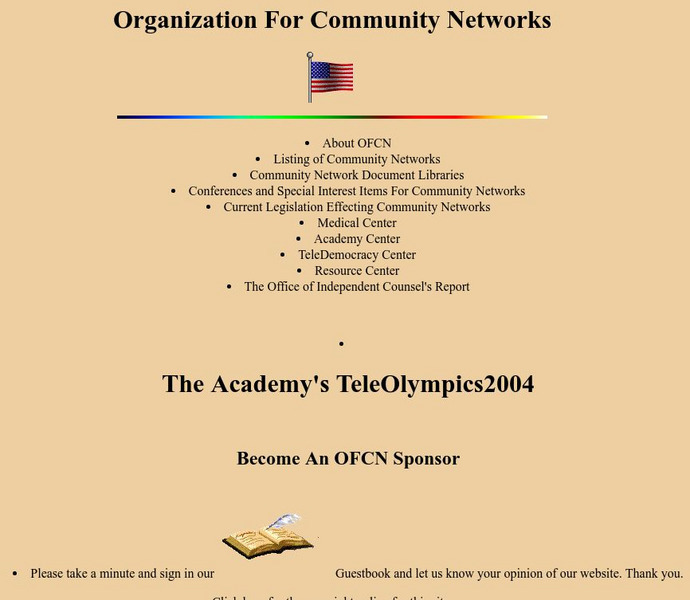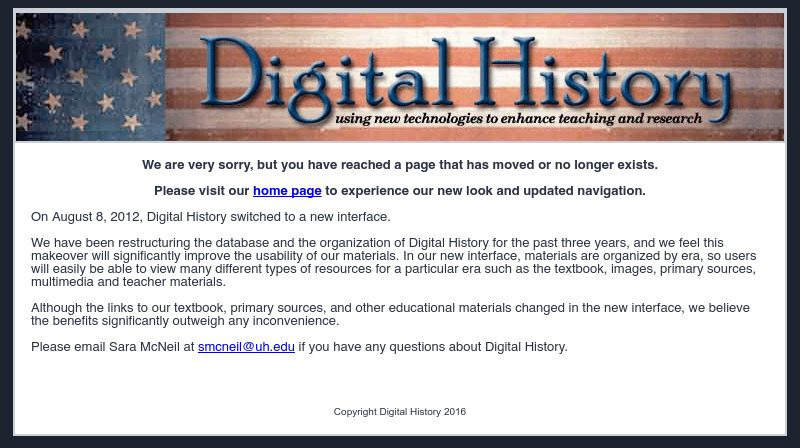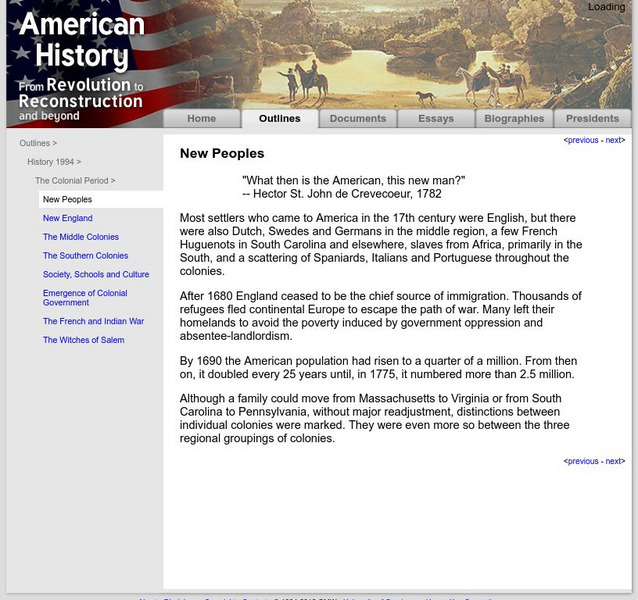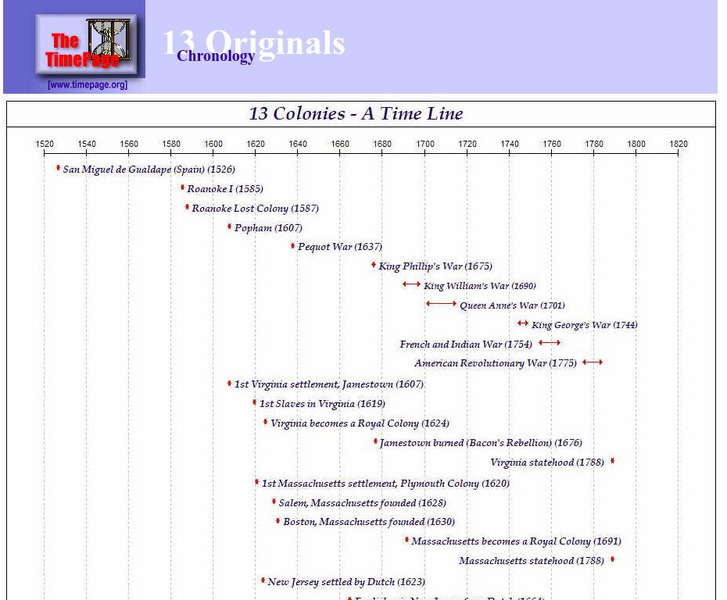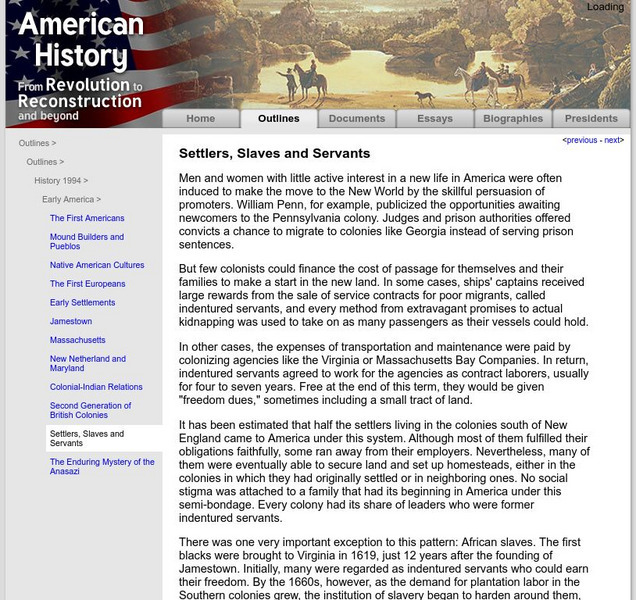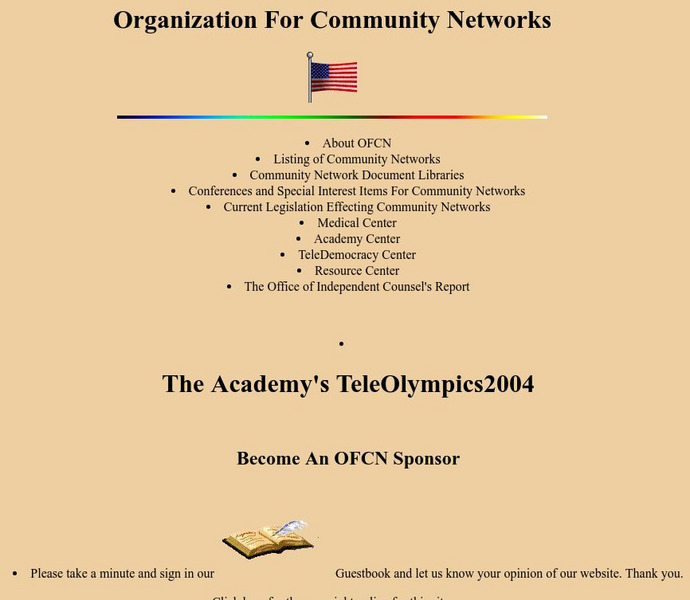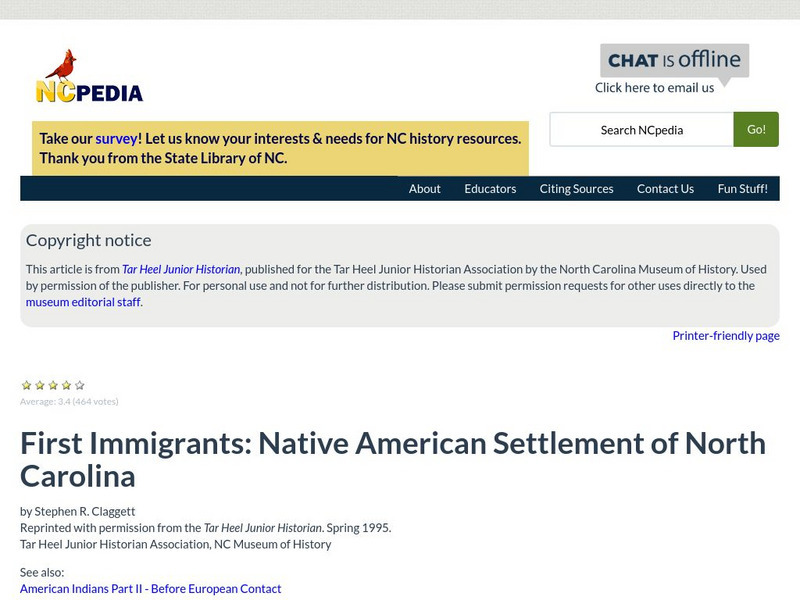Hi, what do you want to do?
University of Groningen
American History: Outlines: Second Generation of British Colonies
The religious and civil conflict in England in the mid-17th century limited immigration, as well as the attention the mother country paid the fledgling American colonies. In part to provide for the defense measures England was...
Organization for Community Networks
Academy Curricular Exchange: A Practical Experiment in Colonization
A detailed lesson plan depicting life in the early American colonies.
Khan Academy
Khan Academy: Slavery in the British Colonies
A self-assessment of Slavery in the British Colonies using primary sources.
CommonLit
Common Lit: "The Founding of American Democracy" by Jessica Mc Birney
A learning module that begins with "The Founding of American Democracy" by Jessica McBirney, accompanied by guided reading questions, assessment questions, and discussion questions. The text can be printed as a PDF or assigned online...
University of Florida
Florida Museum of Natural History: First Colony: Our Spanish Origins
This resource is a lesson plan from the University of Florida Natural History Museum. It is a lesson on the impact that the immigrants of Jamestown, VA had on American culture and the melting pot they created in the early colonial days.
Other
Mission Us: For Crown or Colony?
[Free Registration/Login Required] Authors provide an interactive way to actually experience history in an on-line game. Become Nat Wheeler as he makes his way to Boston in 1770, a crucial time in history! Find your way around Boston to...
OpenStax
Open Stax: Disaffection: The First Continental Congress and American Identity
By reading this section from a chapter on "Imperial Reforms and Colonial Protests," students will be able to describe the state of affairs between the colonies and the home government in 1774 and explain the purpose and results of the...
Digital History
Digital History: How Were the Colonies Able to Win Independence?
A discussion of the several reasons the American colonies were able to defeat the head of the British Empire and become an independent country. See also a very brief description of how the Continental Congress paid for the war.
Other
The Spanish Wars: Spanish American Wars of Independence
A descriptive history of the independence movements in Europe and South America which contributed to the Spanish American Wars from the fifteenth century onward.
Read Works
Read Works: The First American
[Free Registration/Login Required] This passage contains information on Benjamin Franklin and his earning of the title "First American" nickname. This passage is a stand-alone curricular piece that reinforces essential reading skills and...
University of Groningen
American History: Biographies: Lord North (1713 1792)
Lord North was Prime Minister of Great Britain from January, 1770 to March, 1782. His early successes as Leader of the House and his efforts to cut the national debt brought him the confidence of a faction-ridden Parliament and the favor...
University of Groningen
American History: Outlines: New Peoples
Most settlers who came to America in the 17th century were English, but there were also Dutch, Swedes and Germans in the middle region, a few French Huguenots in South Carolina and elsewhere, slaves from Africa, primarily in the South,...
National Endowment for the Humanities
Neh: Edsit Ement: American Colonial Life in the Late 1700s
In this very detailed lesson plan, students will explore what life was like during colonial life in the late 1700s. Students will use what they have learned to write fictional letters to a cousin.
Other
Time Page: 13 Colonies: A Timeline
This is a great timeline that shows what happens in America between 1520 and 1788 when all the colonies have become states. Lots of events are listed.
Other
About Famous People: The American Revolutionary War
A good, general summary of the political and military events of the American Revolutionary War in two clickable parts.
University of Groningen
American History: Outlines: Taxing and Representation
Describes why the colonies objected to being taxed directly by Parliament for revenue. Contains quotes by James Otis and Samuel Adams. Explains the significance of the Stamp Act.
University of Groningen
American History: Outlines: Settlers, Slaves and Servants
This resource provides a brief overview of how many settlers in the colonies were indentured servants and how the system of indentured servitude tied to slavery.
Smithsonian Institution
Smithsonian American Art Museum: Young America in Art
An historical site from the Smithsonian American Art Museum that shows the growth of America through art work by over 45 artists. This site by the Smithsonian Institute has fascinating images showing American artists depicting the...
Quia
Quia: American Colonial Government and Policies
Review your knowledge of the early American government with these interactive games. Play concentration, matching, flashcards, or click on "list of terms" to see the vocabulary used in each activity.
Organization for Community Networks
Academy Curricular Exchange: Original Thirteen Colonies
A lesson plan for helping young scholars remember the names of the the original thirteen American colonies.
University of Groningen
American History: Outlines: The Colonial Period of American History
Comprehensive information about the colonial period of American History. Includes information about New England, colonies, government, people, The French and Indian War, and the Salem Witch Trials.
Quia
Quia: The English Colonies
Test your knowledge of the thirteen colonies with these interactive games. You'll find matching, concentration, flashcards, and a word search, along with a list of terms to refresh your memory.
State Library of North Carolina
N Cpedia: Stephen R. Claggett: Native American Settlement of North Carolina
The English began exploring and settling into the Carolina Colony in the late 1500-early 1600s. The land was already inhabited by Native American tribes. How did they all get along? Who were the Native Americans on the land?
State Library of North Carolina
N Cpedia: John W. Kinchelo, Iii: American Indians at European Contact
Native Americans inhabited the New World long before European explorers began establishing settlements on the land. This entry addresses the challenges the natives had to face upon Europe's arrival, trials in relationships, and how...
Other popular searches
- 13 American Colonies
- American Colonies Map
- Early American Colonies
- Thirteen American Colonies
- The American Colonies
- American Colonies Project
- American Colonies Economy
- Growth of American Colonies
- Comparing American Colonies
- 13 American Colonies Slavery
- 13 American Colonies Map
- Life in the American Colonies






